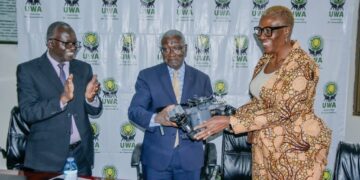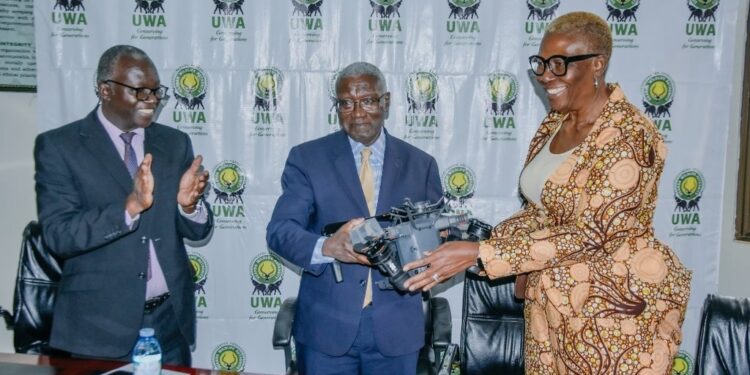The Uganda Wildlife Authority (UWA) has received six advanced unmanned aerial vehicles (drones), from the United Nations Development Program (UNDP) to enhance the authority’s conservation efforts.
The drones were received by the Minister of Tourism, Wildlife, and Antiquities Honourable Tom Butime.
Butime noted, “The drones from UNDP are important in our conservation efforts. They will empower us to protect our wildlife and natural habitats more effectively. We are committed to leveraging this technology to ensure the long-term sustainability of our precious ecosystems. We thank UNDP for their support and look forward to continued collaboration,” he said.
Ms. Nwanneakolam Vwede-Obahor, UNDP resident representative for Uganda, said that the donation underscores the strong collaboration between Uganda and UNDP that is rooted in a mutual dedication to conserving biodiversity and promoting sustainable development.
She added that the UNDP understands the potential of the tourism sector to spur development and improve on the lives of people in Uganda.
“Uganda is a country of natural beauty, our support to UWA reflects our commitment to enhancing Uganda’s capacity to protect its unique wildlife and natural resources. The UNDP will continue to support not only UWA but the tourism sector as a whole because of its contribution to the economic development of Uganda,” she said.
The Executive Director UWA Sam Mwandha said that the newly acquired drones represent a major advancement in UWA’s capacity to monitor and manage protected areas.
“These drones will provide UWA with real-time aerial surveillance, enhance our ability to monitor vast and remote areas, gather crucial data on wildlife movements, and respond swiftly to any threats, thereby significantly strengthening our conservation strategies”
The drones will be deployed across various national parks and wildlife reserves, offering a bird’s-eye view of Uganda’s diverse ecosystems.
Mwandha noted that the technology will assist UWA in tracking animal migration patterns, assessing the health of habitats, and conducting detailed surveys of wildlife populations among others.
“The data collected will also help inform conservation strategies and actions, ensuring that Uganda’s wildlife heritage is preserved for future generations,” he said.
“As UWA integrates these drones into its operations, the authority looks forward to the positive impact this technology will have on wildlife conservation. This initiative is part of a broader strategy to leverage innovative solutions to address conservation challenges and ensure effective conservation of Uganda’s wildlife resources.”









